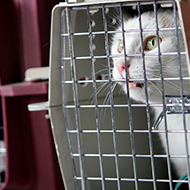Cats Protection welcomes debates on pet travel

Cats Protection are calling for the minimum age of travel for cats to be raised from 15 weeks to six months.
Feline welfare charity Cats Protection has welcomed the news that MPs are to hold two debates on pet travel following concerns cats are getting left behind.
MPs are holding a general debate on pet travel in Westminster Hall today (2 December) and during oral questions in the House of Lords on Tuesday (7 December).
The debates follow a recent Government consultation on pet travel that contained significant changes for dogs - including raising the minimum travel age and banning the movement of dogs that are heavily pregnant. However, the consultation failed to extend the same protection to cats.
As such, Cats Protection is calling on the Government to introduce similar changes to cats - increasing the minimum age of travel from 15 weeks to six months and prohibiting the movement of pregnant cats in their last 42 days of gestation.
The Charity is also pushing for a total ban on the importation of de-clawed cats.
Jacqui Cuff, head of advocacy & government relations at Cats Protection, said: “While the Government is looking at changes to improve the welfare of puppies and dogs being brought into the UK, it is not considering the same improvements for cats, which is a huge concern.
“We know there has been an increase in the numbers of people looking to buy a kitten, and prices have also gone up. The current laws on importing kittens and cats are far too relaxed and urgently need to be tightened up to prevent a surge in unscrupulous traders importing kittens into Great Britain for onward sale.”
Lord Black of Brentwood, who will be raising the issue in an oral question in the House of Lords, said: “Over the years, I have been an advocate for the welfare of our companion animals. We are a nation of animal lovers, and pets are so important to the lives of many, an important part of the family, and providers of joy and companionship.
“There are risks in buying pets online, particularly from sellers based abroad, and the Government’s review of the pet travel provisions presents a real opportunity to clamp down on unscrupulous sellers smuggling pets into Great Britain.”
He added: “While the horrors of puppy smuggling are well publicised, we must not open the door to sellers turning their attention to bringing in kittens to meet the UK market. New pet travel provisions must apply to kittens as well as puppies, both of whom need legal protection.”



 The latest
The latest